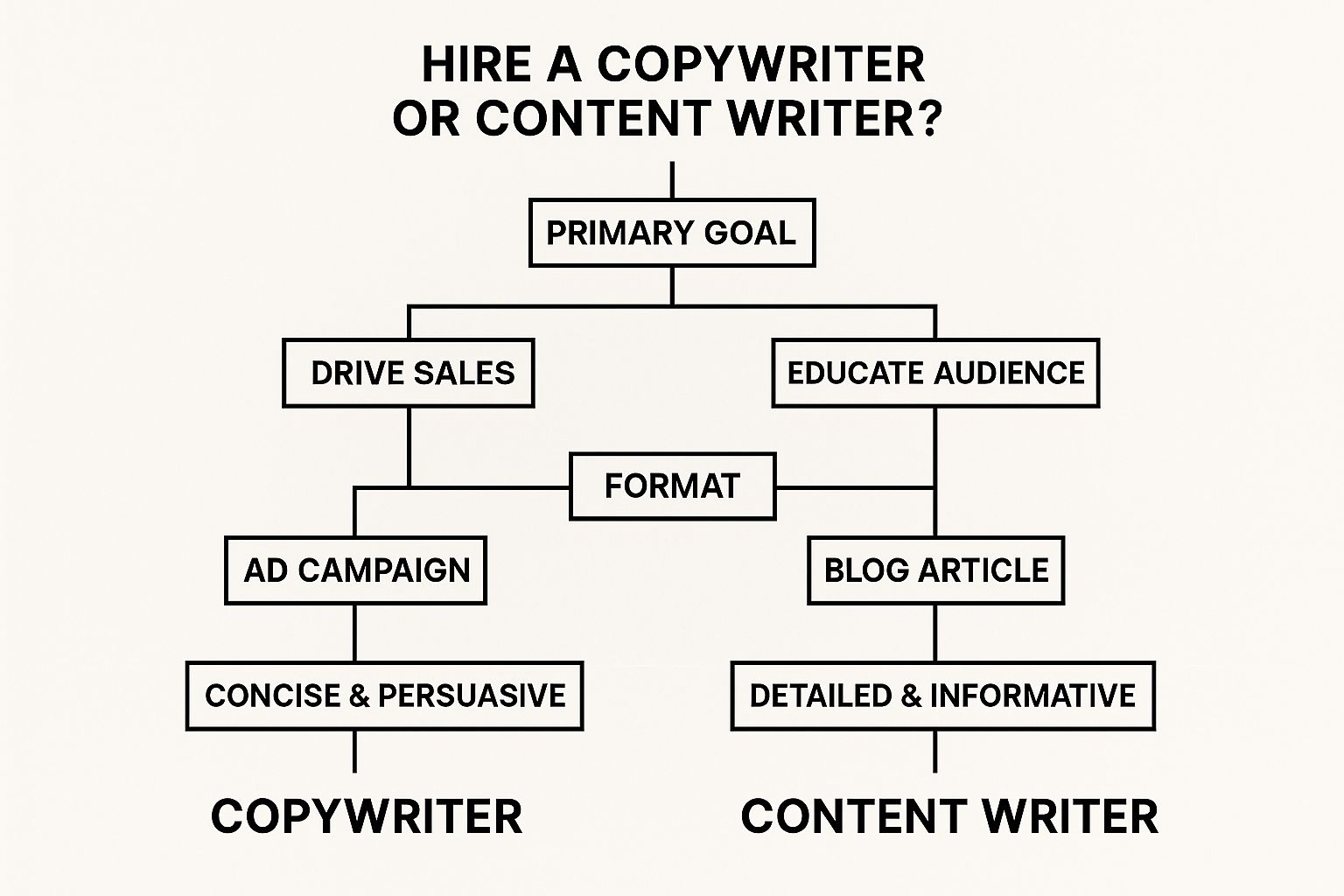If you boil it all down, the difference is simple: copywriting pushes for immediate action, while content writing patiently builds authority and trust over the long haul. Think of it this way: copywriting is the salesperson closing the deal right now. Content writing is the trusted advisor who educates you, making that eventual sale feel natural and easy.
Defining Copywriting Vs Content Writing

While both jobs demand excellent writing chops and a real understanding of the audience, they serve completely different strategic purposes. You can't just swap one for the other. They're two sides of the same marketing coin, and you need both to win.
Their roles typically line up with different stages of the buyer's journey. Copywriting is the heavy hitter at the bottom of the sales funnel—its job is to convert leads into customers with sharp, persuasive messages. On the other hand, content writing works its magic at the top and middle of the funnel, educating and engaging people to establish the brand as a credible expert.
To get a better handle on the art of persuasion, check out this practical guide to copywriting.
Key Takeaway: Copywriting is salesmanship in print. It closes the deal. Content writing is becoming a trusted source of information. It builds the relationship that makes the deal possible in the first place.
Quick Comparison Copywriting vs Content Writing
To make the distinction crystal clear, here’s a straightforward table breaking down the core differences between these two essential writing disciplines.
| Criterion | Copywriting | Content Writing |
|---|---|---|
| Primary Goal | To persuade and drive immediate action (e.g., sales, sign-ups, clicks). | To inform, educate, entertain, and build brand authority over time. |
| Typical Format | Ads, sales pages, email campaigns, product descriptions, landing pages. | Blog posts, articles, white papers, case studies, ebooks, newsletters. |
| Tone of Voice | Persuasive, urgent, emotional, and often sales-focused. Direct and concise. | Informative, educational, conversational, and engaging. More detailed. |
| Time Horizon | Short-term impact and immediate results. | Long-term strategy focused on building an audience and trust. |
| Key Metrics | Conversion rates, click-through rates (CTR), cost per acquisition (CPA). | Organic traffic, search rankings, time on page, social shares, lead generation. |
This table shows that while they both use words, their goals, formats, and measures of success are worlds apart. A great marketing strategy knows exactly when to deploy each one.
The Core Objective: Persuasion vs. Information

Even though both copywriting and content writing use words to reach an audience, their core goals couldn't be more different. Grasping this difference is the secret to settling the copywriting vs. content writing debate and figuring out which one your business needs right now.
At its heart, copywriting is all about persuasion. It has one job: to get the reader to do something specific, and do it now. This isn't always about making a sale on the spot. It could be clicking a button, downloading a free guide, signing up for a newsletter, or filling out a contact form. Every single word is a stepping stone to that one desired action.
This is where marketing psychology really takes the driver's seat. A good copywriter knows how to tap into emotions, speak directly to a customer's biggest problems, and frame a product as the perfect solution.
The Art of Persuasion in Copywriting
Great copy doesn't just talk about features; it sells a better future. A copywriter won’t say a mattress is made of "memory foam." Instead, they'll promise "the deepest, most restorative sleep of your life, so you can wake up energized and pain-free." See the difference?
You can see copywriting doing its heavy lifting in places like these:
- Google Ads: With just a handful of words, the copy has to grab attention and get that click over a dozen competitors. It’s all about action verbs and a unique value proposition.
- Landing Pages: An entire page is built around a single, focused argument to get one specific conversion, like a purchase or a sign-up. Every headline, bullet point, and testimonial is there to support that one goal.
- Email Sales Campaigns: These are carefully crafted to build excitement and a sense of urgency, often leading to a final, can’t-miss offer that pushes for an immediate decision.
These tactics aren't just guesses; they're based on proven psychology. To really connect with your audience and get them to act, it's essential to understand the core principles of persuasion that attract your target audience.
The Goal of Information in Content Writing
On the flip side, content writing is all about information. The main goal here is to educate, inform, or entertain people to build a long-term relationship and establish your brand as an authority. If copywriting is a sprint to the sale, content writing is a marathon focused on building trust.
Copywriting is engineered to sell a solution directly to a customer. Content writing is designed to solve a problem for an audience, building trust that leads to future sales.
This approach makes your brand the go-to, helpful resource in your industry. So when people are finally ready to make a purchase, they naturally think of the company that’s been giving them value all along. It’s no surprise there are over 600 million active blogs online—this strategy flat-out works.
Building Authority Through Content
Content writing is what fuels modern SEO and creates die-hard brand fans. It works because it answers the questions your audience is already asking, positioning your brand as the expert they can rely on.
Here’s where you’ll see content writing in its element:
- In-depth Blog Posts: An article like "A Beginner’s Guide to Investing in Real Estate" doesn't try to sell you anything directly. It offers huge value, answers tough questions, and builds a foundation of trust with potential clients.
- Comprehensive Guides: A software company might publish a big guide on "How to Improve Team Productivity." This helps their ideal customer while naturally showing how their tool fits into the solution.
- Case Studies: These are powerful stories that show, not just tell, how you’ve helped real customers get real results.
Ultimately, the clash between copywriting vs. content writing isn't about which one is better. It’s about knowing their missions. Copywriting helps you close the deal today. Content writing makes sure you have a pipeline of loyal customers ready to buy from you tomorrow.
Analyzing the Financial Impact and ROI

When you're deciding where to put your marketing dollars, the conversation always comes back to the financial return. Both copywriting and content writing are investments meant to grow your business, but they generate value in completely different ways and on different timelines. If you want to allocate your budget effectively, you have to understand how to measure each one.
Copywriting is all about getting immediate, measurable results. Since its only job is to get someone to take action—buy now, sign up, click here—its return on investment (ROI) is usually direct and easy to see. You can draw a straight line from the copy to the cash register, making its financial impact crystal clear.
The Direct ROI of Copywriting
Let's say you run an e-commerce store and your main product page is converting at 2%. You bring in a copywriter who overhauls the headline, polishes the product description, and rewrites the call-to-action. Suddenly, your conversion rate jumps to 3%.
That 1% bump might not sound like much, but it's actually a 50% increase in sales from that page. If you get 10,000 visitors a month, that one project just brought in hundreds, maybe thousands, of extra sales. Calculating the ROI is simple: just stack the new revenue up against what you paid the copywriter.
It's this direct link to sales that makes copywriting such an easy investment for businesses to justify. You can track its success with hard numbers:
- Conversion Rate: The percentage of people who do what you want them to do.
- Cost Per Acquisition (CPA): How much you spend to get one new customer. Good copy drives this number down.
- Average Order Value (AOV): Persuasive copy can upsell or cross-sell, increasing how much each customer spends.
- Click-Through Rate (CTR): For ads and emails, this tells you if your copy is compelling enough to earn a click.
This clear connection between words and revenue is even reflected in compensation. Because it's designed to make money, copywriting's impact is often valued slightly higher in the short term. According to Indeed, the average U.S. copywriter salary is around $58,560 a year, a little more than the average content writer's salary of $56,076. That small gap often reflects the market's appreciation for immediate, bankable results. You can get more insight into how copywriting’s purpose affects its value on Ahrefs.com.
The Compounding Value of Content Writing
Unlike the quick wins from copywriting, the ROI from content writing is a long game. Its value builds up over time, like an investment account. You're not focused on one transaction; you're focused on building a brand asset: an engaged audience.
Content writing's ROI isn't a sudden spike; it's a rising tide. It's the slow, steady growth of trust, authority, and organic traffic that lifts all other marketing efforts.
You're not going to see a huge financial return the day you publish a blog post or a white paper. Instead, its value compounds over months and even years. A great piece of content starts ranking on search engines, pulling in a steady flow of free, organic traffic.
This consistent traffic turns into leads, builds your email list, and warms up potential customers until they’re finally ready to make a purchase. While you can't attach a direct sales figure to a single blog post, a solid content strategy can seriously reduce how much you spend on paid ads, lowering your overall customer acquisition costs over time.
Measuring the ROI for content writing is a bit more complex, but it's just as crucial. You'll be tracking metrics like:
- Organic Traffic Growth: Are more people finding you through search engines?
- Keyword Rankings: Are you showing up on page one for your target search terms?
- Lead Generation: How many new contacts are you getting from content downloads or newsletter sign-ups?
- Customer Lifetime Value (CLV): Good content builds loyalty and keeps customers coming back, increasing what they're worth to your business.
Ultimately, the debate isn't about which one has a "better" ROI. It’s about what you need right now. Copywriting delivers fast, quantifiable wins. Content writing builds a sustainable engine for long-term growth.
Comparing the Writing Process and Skill Sets
It’s one thing to know the end goals of copywriting and content writing are different, but it’s another to understand how they’re made. The creative journey and the specific talents needed for each are miles apart. The real distinction in the copywriting vs. content writing debate pops up when you look at how each piece is actually built—from the first spark of an idea to the final published word. It’s not just about what is written, but how.
A copywriter’s process is basically a deep dive into the human psyche. Their work starts with customer research, but we’re not just talking about demographics. They need to get into the customer’s head to understand their biggest frustrations, secret wishes, and the emotional triggers that make them tick. The whole process is hyper-focused on finding that one powerful message that sticks and gets someone to act.
A content writer's job is to be the best answer on the internet for a specific question. A copywriter's job is to be the most compelling reason to act right now. This difference in purpose shapes every step of their creative process.
The Copywriter's Toolkit
A copywriter’s skills are sharp, direct, and rooted in psychology. Their workflow is systematic and fueled by data, often involving quick tests and tweaks to see what really connects with people.
A typical copywriting project usually goes something like this:
- Voice of Customer Research: This means digging through customer reviews, forums, and survey responses to hear exactly how people talk about their problems. This isn't just research; it's mining for the raw material of authentic, high-converting copy.
- Headline Ideation: A good copywriter will brainstorm dozens, sometimes even hundreds, of headlines. They’re hunting for the one that grabs attention immediately and screams a clear benefit. It’s often the most critical part of the whole shebang.
- Crafting Brief, Punchy Copy: Every single word has to fight for its spot on the page. Copywriters are masters of saying more with less, using simple language to hit an emotional nerve and build a rock-solid case for the call to action.
- A/B Testing: Great copywriters don't just rely on gut feelings; they test everything. They’ll run multiple versions of an ad, landing page, or email to see which one gets better results, constantly refining their words based on hard data.
This isn’t about telling long, winding stories. It’s about surgical precision—finding the perfect combination of words that makes a customer pull out their wallet.
The Content Writer's Method
On the flip side, a content writer’s process is all about structure, solid research, and building authority. Their main job is to create a go-to resource that fully answers a user's question and shows search engines that they know their stuff. This skill set is a mix of old-school journalism and a savvy understanding of on-page SEO.
The path to a top-notch article looks a lot different:
- Topic Ideation & Keyword Research: It all starts by figuring out what the target audience is actually searching for. The writer dives into search volumes and competition to find topics where they can realistically rank and get noticed.
- Thorough Research & Outlining: Content writers become temporary experts on whatever they're writing about. They pull information from a bunch of credible sources and map out their article logically to walk the reader through the topic step-by-step.
- Drafting & Storytelling: This is where the magic happens. The focus is on writing clearly, delivering real value, and weaving a story that keeps the reader hooked from the first sentence to the last.
- On-Page SEO Optimization: Once the draft is done, the writer polishes it for SEO. This means naturally working in keywords, adding internal links to other relevant posts, optimizing headings, and making sure the whole piece is easy to read.
While a copywriter obsesses over conversion rates, a content writer is all about delivering informational value that builds trust for the long haul. If you're curious about blending these two worlds, you can learn more about how to write a good blog post that ranks and converts. At the end of the day, both jobs demand killer writing skills, but their day-to-day processes couldn't be more different because they’re built to hit entirely different business goals.
When to Use Copywriting vs. Content Writing
It’s one thing to know the textbook definitions of copywriting and content writing. It’s another thing entirely to know exactly which one to pull out of your toolbox for a specific business goal. That's what gets you real results. The sharpest marketing strategies don't just pick one; they weave them together to guide people from "just looking" all the way to "take my money."
The right choice really boils down to your immediate goal. Are you trying to land a sale today? Or are you building a relationship for a sale down the road?
Think of it this way:

This decision path is pretty clear. If you need direct sales using persuasive tools like ads, you call in the copywriter. But if your mission is to educate and build authority with things like articles, that's a job for the content writer.
Scenario 1: Launching a New Product
A product launch is a high-stakes, all-hands-on-deck event. It’s also the perfect example of how these two writing styles need to work together in perfect harmony. You have to build hype, educate your potential customers, and then hit them with a strong, clear call to action.
Your Go-To Strategy: A powerful blend of content writing and copywriting.
- Content Writing (Pre-Launch): In the weeks before the big day, you'll be publishing blog posts, guides, and maybe a case study or two. The goal here isn't to sell—it's to talk about the problem your product solves. This warms up the market and creates an audience that’s ready and waiting.
- Copywriting (Launch Day): Once the "buy" button is live, every single word needs to be sharp, persuasive, and geared for action. This is where your sales page, email blasts, social media ads, and Google ad campaigns come to life.
It's a classic one-two punch. You prime the audience with valuable content, then you convert that interest with compelling copy.
Scenario 2: Increasing Website Traffic and SEO
What if your main goal is simply to get more eyeballs on your site through search engines? This is a long-term play, not a quick win. You’re building a sustainable pipeline of organic leads.
Your Go-To Strategy: A dedicated, consistent content writing effort.
High-quality, long-form content is the absolute foundation of modern SEO. Search engines like Google are designed to reward websites that provide the best, most helpful answers.
To get there, you need a steady diet of:
- In-depth blog posts that target the specific phrases your audience is searching for.
- Pillar pages or ultimate guides that cement your website as the go-to authority on a core topic.
- Case studies that offer real-world proof and pull in valuable long-tail keyword traffic.
Of course, while traffic is great, sales are better. Many savvy businesses also learn how to boost sales with blogs by strategically sprinkling in persuasive copy elements.
Scenario 3: Improving Brand Reputation
Building—or rebuilding—a brand's reputation is all about trust and expertise. A hard sales pitch here feels completely out of place and can even backfire, making you look desperate or untrustworthy. The aim is to show your value, not just talk about it.
Your Go-To Strategy: Almost exclusively content writing.
Authenticity is everything. You need your audience to see you as a reliable partner who is there to help, not just a vendor trying to make a quick buck.
To build trust, you must first be trustworthy. Content writing achieves this by consistently providing value with no immediate expectation of a sale, positioning your brand as an ally rather than just a vendor.
Focus your energy on creating assets that prove you know your stuff and that you genuinely care about your audience. Think thought leadership articles, transparent company updates, and detailed educational guides.
As you get comfortable deploying each style, it's critical to see how they fit into the bigger picture of mastering a comprehensive digital marketing content strategy. A solid plan ensures every word you publish, whether it’s for a sale or for education, works together toward a common goal.
To make the decision even easier, here's a quick reference guide matching common business goals to the right writing discipline.
Choosing the Right Tool for the Job
| Business Objective | Primary Discipline | Recommended Content/Copy Assets |
|---|---|---|
| Generate Immediate Sales | Copywriting | Sales Pages, PPC Ads, Email Campaigns, Product Descriptions |
| Increase Organic Traffic & SEO | Content Writing | Blog Posts, Pillar Pages, "How-To" Guides, Case Studies |
| Build Brand Authority & Trust | Content Writing | Thought Leadership Articles, White Papers, Ebooks, Webinars |
| Launch a New Product/Service | Both (Hybrid) | Pre-Launch: Blog posts, guides. Launch: Sales page, ads. |
| Nurture Leads Over Time | Both (Hybrid) | Content Writing for value (newsletters), Copywriting for action (offers). |
| Announce Company News | Content Writing | Press Releases, Blog Updates, Social Media Posts |
| Improve Customer Retention | Content Writing | Onboarding Guides, Help Docs, Success Stories, Newsletters |
Think of this table as your cheat sheet. When a new business goal comes up, a quick glance can help you point your writing team—or yourself—in the right direction from the very start.
Choosing Your Career Path and Earning Potential
Picking a career in copywriting or content writing isn't just about what you like to write—it's a major financial and professional decision. Both fields are full of opportunity, but they come with very different career ladders, pay scales, and starting points. Getting a handle on these economic realities is a must for any writer trying to build a career that lasts.
Generally speaking, it's easier to get your foot in the door as a content writer. You mainly need solid research and writing chops, a good grasp of SEO, and the ability to organize information clearly. The downside? That lower barrier to entry means more people are trying to do it, which can push down rates for beginners.
On the other hand, top-tier copywriting is a whole different ballgame. It’s a specialized skill built around persuasion. You’re not just writing—you’re diving into consumer psychology, running A/B tests, and crafting words that make people pull out their wallets. That's a skill businesses will happily pay a premium for.
Breaking Down the Earning Potential
Historically and statistically, the paychecks for copywriters and content writers look pretty different. While it's easier to start out in content writing, a skilled copywriter can pull in thousands for a single sales page or email campaign. The data consistently points to higher average salaries in copywriting because the work is tied directly to making money. Of course, there are always exceptions. You can dig deeper into the economic differences between these roles at ashleygainer.com.
Just because top copywriters often make more doesn't mean content writing can't be incredibly profitable. If you specialize in a high-value area, you can make a fantastic living.
Here are a few content writing niches that pay very well:
- Technical Writing: Think detailed user manuals, API guides, and documentation for tech companies. It takes a special talent to make complex tech information easy to understand.
- Finance and Healthcare: These are heavily regulated industries that need writers who can tackle complicated subjects with absolute accuracy. Experts here are in high demand.
- Ghostwriting for Executives: C-suite leaders and industry experts often pay top dollar for skilled writers to craft their thought leadership articles, LinkedIn posts, and even books to build up their personal brands.
The biggest difference in earning potential boils down to one word: attribution. A copywriter's value is easy to see—their work led to a sale. Content writing builds a brand's authority and brings in organic traffic over the long haul, which is hugely valuable but harder to connect to a specific dollar amount.
At the end of the day, the right path is all about what you enjoy and where your skills lie. If you get a thrill from looking at conversion data and love the challenge of making a direct sale, copywriting is probably for you. Small businesses depend on great copy to stand out, but they also need a solid plan for content marketing for small business to build a brand that lasts.
If you’re passionate about deep-diving into research, educating an audience, and telling stories that build authority, a career in specialized content writing can be just as rewarding—both personally and financially. The real secret is to become the go-to expert in whatever field you choose.
Frequently Asked Questions
Even after breaking it all down, some common questions about copywriting and content writing still pop up. Let's clear up any lingering confusion so you know exactly how to use each one.
Can One Person Do Both Copywriting and Content Writing?
Yes, absolutely. You'll find plenty of talented writers who can do both, sometimes called "hybrid" or "full-stack" writers. These pros know how to switch gears from an educational, storytelling style to a punchy, persuasive one.
Keep in mind, though, that they are different skills that require different ways of thinking. If you have a high-stakes project like a big product launch or a new sales page, hiring a specialist copywriter is usually money well spent. But for day-to-day blog and social media management, a skilled writer who can do both is often the perfect choice.
Which Is More Important for SEO?
For driving organic search traffic, content writing is king. Search engines like Google are designed to reward in-depth, high-quality content that gives searchers exactly what they're looking for. Long-form articles, guides, and blog posts give you more chances to rank for keywords, build authority on a topic, and earn those all-important backlinks.
But copywriting has a critical role to play, too. It’s what you use for your title tags and meta descriptions—the little snippets of text that have to convince someone to click your link in the search results. A smart strategy uses content writing to draw in traffic and copywriting to turn that traffic into leads or sales.
Key Insight: Here's a simple way to think about it: Content writing gets you on the first page of Google. Copywriting gets people to actually click your link instead of the nine others on the page.
How Do I Know if I Need a Copywriter or a Content Writer?
It all comes down to your main goal right now. Just ask yourself this one question: "What is the #1 thing I need to accomplish with this piece of writing?"
- You need a copywriter if: Your goal is to get someone to take a specific action, and to do it now. This could be improving conversions on a product page, writing a new ad campaign, or getting more sign-ups for a webinar. The focus is on immediate results you can measure.
- You need a content writer if: Your goal is to build your brand and your audience for the long haul. This means you want to boost organic traffic, educate your audience, improve search rankings, and become a trusted name in your industry.
The most successful brands don't pick one over the other. They use both together to guide people from the first time they hear about you all the way to becoming a loyal customer.
Do Copywriters Need to Understand SEO?
They definitely do, but they look at it through a different lens than a content writer. A copywriter’s main job with SEO is all about conversion. They need to be masters at writing irresistible title tags and meta descriptions that get a high click-through rate (CTR) from the search engine results page (SERP).
They also have to know how to weave keywords into a sales or landing page without making it sound robotic or losing the emotional connection. While a content writer is trying to build broad authority across a topic, a copywriter is targeting those specific, high-intent keywords that people use when they're ready to make a decision.
Ready to build a powerful content engine that drives consistent traffic and establishes your brand as an authority? Copy Masters delivers 30 search-optimized articles every month, turning your blog into a predictable source of leads and sales. Stop worrying about content and start outranking your competitors.
Learn how Copy Masters can transform your SEO results.
- A Guide to B2B SaaS Marketing - August 16, 2025
- Improving Search Engine Rankings: Your Practical Masterclass - August 15, 2025
- Copywriting vs. Content Writing: Which is Better for Your Marketing? - August 13, 2025
